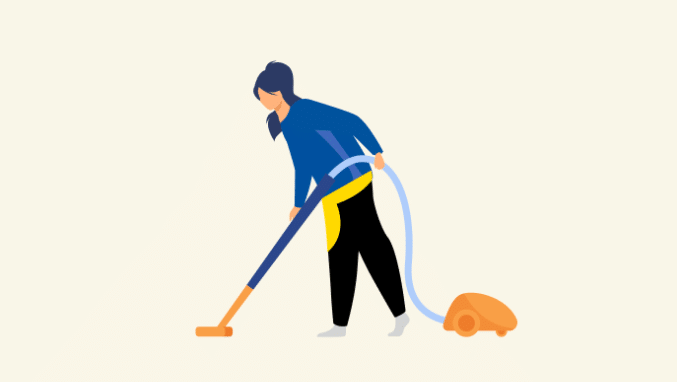Request An Estimate
If the inside and outside of your home look like you started decorating for Halloween early, may need to learn how to remove spider webs. Cobwebs and spider webs mean one thing: You have some creepy crawlers living in your home. For the record, spiders aren’t all bad. They help get rid of other pesky bugs like mosquitoes and flies, which can decrease bug bites and the spread of disease. But when it comes down to it, spiders just aren’t pleasant to encounter. They creep into tiny cracks and crevices and build webs that capture fresh meals and collect dust—leaving unsightly messes in their wake.
Keep reading to learn how to get rid of cobwebs and keep them from coming back.
So What Are Cobwebs?
Before you learn how to get rid of cobwebs, it’s important to understand that spiders don’t need many insects and other prey to survive. That small appetite means house spiders can live a long time and stay out of sight, so it’s hard to know sometimes if you’ve got a cobweb or a spider web. Some spiders even eat their webs to recycle the protein and relocate to another part of your home to build a new web.
Because they keep such a low profile, the only way you know if you have a spider in the house is through their web. How can you be sure you’re removing a cobweb or a spider web? Unlike spiderwebs, which spiders use to catch and trap their prey, cobwebs are vacant “homes” spiders have abandoned to move onto better pastures—in this case, usually just a new area of your house.
If you find a spider web, you can keep an eye on it for a while to see if there is any activity. If the same old dead insects are there for a couple of days, there’s a good chance you’re dealing with a cobweb. Of course, you could always tap the web lightly and see if anyone’s home! Another telltale sign of a cobweb is the lack of housekeeping because no self-respecting spider lets their web get dirty and unkempt.
When a house spider moves on, the stray cobweb left behind is sticky and a magnet for pollen, dust particles, and other debris. But these transient house guests also leave behind other dust collectors. Spiders spin a little safety line as they move from one surface to another. These leftover strands collect pollen and dust and result in the wispy streamers you may see around the house.
What Causes Cobwebs?
Although the term “cobweb” and “spider web” are often used interchangeably, for our purposes, a cobweb is vacant, and a spiderweb is inhabited. Technically, the term “cobwebs” refers to a specific type of web made by cobweb spiders. These home-abandoning spiders get their name from the disorganized construction of their webs. Different species of cobweb spiders have different disorganized patterns of web-building, but they are all designed to capture prey.
What Is the Difference Between a Cobweb and a Spider Web
The cobweb vs. spider web issue is more than a matter of what we call these unsightly messes. You probably don’t care what kind of spider made the web, or how neat or organized it is. You just want it gone! But it’s good to know what to expect before we begin cleaning out all those cobwebs.
For most of us, spotting a cobweb means it’s been there long enough to collect dust. If the web is tattered and full of dust, there’s a good chance it has been abandoned. If you have a keen eye and notice a spider web that looks almost transparent and strongly constructed, there’s a good chance there’s a spider close by. So the important difference between a cobweb and a spider web is that cobwebs usually don’t have spiders roosting in them!
How to Clean Cobwebs
For most of us, the best way to clean cobwebs is from a distance! Combating the sticky strands is not that tough, but most people don’t want to get up close and personal with spider graveyards. Luckily, getting rid of cobwebs can be done with some distance between you and the abandoned critter homes.
When you’re learning how to clean spider webs, your trusty vacuum cleaner is your greatest asset. Attack the corners of ceilings and any other nooks and crannies, especially around windows and doors. Soft dusters with long handles work well, too—plus, using an extension will keep you off wobbly chairs as you strain to reach the ceiling. You can also get creative and attach an old sock or cleaning cloth to the end of a broom or yardstick and swipe away any webs lurking in the corners.
If cobwebs have found their way onto curtains or other fabric, follow the vacuum method and use a lint roller to pick up those remaining sticky strands. Always wash the fabric if you are able to—you don’t want spider leftovers on your old winter coat, right?
How to Get Rid of Spider Webs
Windows, doorways, and cracks and crevices are spiders’ favorite ways to get into your home. After getting rid of your corner cobwebs, check out your windows. There’s a good chance you’ll find webs with and without spiders. Use your vacuum’s crevice tool to suck up whatever webs you can. Then grab a spray bottle of water or a hose.
Spiders frequently make webs in the corners of windows, between screens and windows, and in other common hiding places. The easiest spider web removal technique is to spray down the window and screen from the inside with your water bottle. If you’re using a water hose, use the spray nozzle and soak the window and screen from the outside.
By spraying your windows, you’re cleaning spider webs out and sending any spiders still hiding out on their way. Clean the window and wipe down screens with a cloth to remove any remaining residue from the spider webs.
Should You Remove Spider Webs in Your Home?
Before we move on to how to get rid of cobwebs, we think it’s important that you know the whole story. Sure, house spiders and their webs can be kind of creepy, but a world without spiders wouldn’t even be liveable! Here are a few ways spiders do their part to make the Earth a better place.
- Spiders Help Keep Us Fed
All the spiders in the world combined annually eat about 440 to 880 million tons of insects and other pests. Without spiders, those insects would eat our food supply, and we would starve. Think about that the next time you start to squish an innocent little spider!
- Spiders Are Nature’s Pharmacy
All spiders are venomous, and their venom contains numerous chemical compounds proven to be beneficial for pain relief and more. The polypeptides and proteins in spider venoms are effective as antimicrobials and neurotoxins and show potential for cancer therapy. Spider venoms in pharmacology are a critical element that can help humans live longer, better lives.
- Spiders Provide Free Pest Control
Spiders not only do their fair share of protecting crops from tons of insects, but they also do an impressive job of keeping your home pest free. Roaches, flies, earwigs, and mosquitos we find in our homes may make us squirm, but they are a feast for spiders. Make house spiders feel at home, and they can minimize unwanted guests and the potential diseases they can carry.
How can you tell if house spiders are earning their keep in your home? Inspect their webs for fresh kills and remnants below the web. If you find bits and pieces of their insect meals on the floor, you can rest assured they’re pulling their weight.
Still not convinced spiders don’t deserve their scary reputation? Most spiders don’t bite humans, and most venom has only mild, short-lived effects. According to the CDC, black widows and brown recluses are the two spider species that are dangerous, and only some of these species bite.
It’s safe to assume the rest of the spider species are working hard to keep us healthy and happy. But if you still can’t stand your little roommates, here’s how to get rid of spider webs.
How to Prevent Spider Webs and Cobwebs
The best way to get rid of spider webs is to prevent the spiders from ever coming in. Fall is the perfect time for spiders, insects, and other critters to seek shelter, so stay one step ahead of them and block their access. Seal cracks in windows and door frames and cover your vents with insect screens. This preventive maintenance will keep spiders and other pests that naturally inhabit the outside of your home from entering.
Sealing entry points probably won’t directly affect the number of house spiders in your home because they don’t typically come from outside. Nevertheless, preventing other insects from getting in your home could reduce your house spiders’ food supply. While you’re outside covering up the cracks, move any of your potted plants a few extra feet from the house. Spiders love to hide inside shrubs and leafy vegetables, so if you’re going to give them a home, keep them away from yours.
An additional line of defense to prevent cobwebs from forming in your house is to dab your home with scents that drive spiders away. Most spiders won’t enter an area that has traces of tea tree, lemon, peppermint, or eucalyptus. Dab some of these essential oils onto small cotton balls and hide them inside the cracks you can’t seal, or spray the scents directly in the corners of your home to deter the creepy creatures.
Other natural spider repellents include cedar, garlic, and white vinegar. Cedar chips or balls placed in areas where spiders live can send them packing. Crushed garlic or white vinegar mixed with water in a spray bottle makes an excellent all-natural solution you can spray in corners, along baseboards, and other known spider hangouts.
Now that you know how to get rid of cobwebs and those pesky little creepers at bay, you can focus time and energy on making your home welcoming for all your guests. Just remember, if you need help cleaning cobwebs or anything else, The Maids is here for you! We do everything from one-time cleaning to holiday cleaning. Call us at 1-800-THE-MAIDS today or get a free online quote!
Request An Estimate










